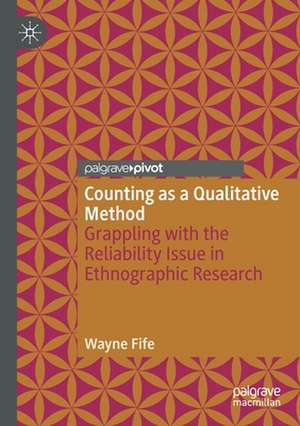Counting as a Qualitative Method: Grappling with the Reliability Issue in Ethnographic Research
Autor Wayne Fifeen Limba Engleză Paperback – 3 ian 2021
| Toate formatele și edițiile | Preț | Express |
|---|---|---|
| Paperback (1) | 411.75 lei 6-8 săpt. | |
| Springer International Publishing – 3 ian 2021 | 411.75 lei 6-8 săpt. | |
| Hardback (1) | 417.90 lei 6-8 săpt. | |
| Springer International Publishing – 3 ian 2020 | 417.90 lei 6-8 săpt. |
Preț: 411.75 lei
Nou
Puncte Express: 618
Preț estimativ în valută:
78.79€ • 82.10$ • 65.24£
78.79€ • 82.10$ • 65.24£
Carte tipărită la comandă
Livrare economică 03-17 aprilie
Preluare comenzi: 021 569.72.76
Specificații
ISBN-13: 9783030348052
ISBN-10: 3030348059
Pagini: 140
Ilustrații: IX, 140 p.
Dimensiuni: 148 x 210 mm
Greutate: 0.19 kg
Ediția:1st ed. 2020
Editura: Springer International Publishing
Colecția Palgrave Pivot
Locul publicării:Cham, Switzerland
ISBN-10: 3030348059
Pagini: 140
Ilustrații: IX, 140 p.
Dimensiuni: 148 x 210 mm
Greutate: 0.19 kg
Ediția:1st ed. 2020
Editura: Springer International Publishing
Colecția Palgrave Pivot
Locul publicării:Cham, Switzerland
Cuprins
Chapter 1: The Reliability Issue.- Chapter 2: Creating a Counting Schedule.- Chapter 3: Success, Failure, and a Missed Opportunity.- Chapter 4: Counting Qualitative Results.- Chapter 5: Counting in the Archives.- Chapter 6: Tourism – Counting the Overlooked.- Chapter 7: Making Fiction Count.- Chapter 8: The Importance of Counting for Qualitative Research.
Notă biografică
Wayne Fife is Professor of Anthropology at Memorial University, Canada. He is the author of Doing Fieldwork (2005) and some two-dozen peer-reviewed journal articles. He has done research and written about aging in Ontario, education in Papua New Guinea, Pacific Island missionaries, ecological and heritage tourism in Newfoundland, imaginary worlds, and research methods and theory.
Textul de pe ultima copertă
“This book will be very valuable for teaching students how to use counting in the context of research and analysis in sociocultural anthropology. It is full of very vividly described examples from the author’s own research that make the book’s explanation of counting as a research method clear and engaging.”
—Vanessa Fong, Professor of Anthropology, Amherst College, USA
—Vanessa Fong, Professor of Anthropology, Amherst College, USA
This book aims to explore counting as an often-overlooked research tool for qualitative projects. Building off of a research method invented by the author in 1986 called counting schedules, this volume provides instruction on how to use counting not only to enhance fieldwork results, but also as a form of analysis for extant field notes, interview results, self-reporting diaries or essays, primary archival material, secondary historical texts, government sources, and other documents and narratives, including fictional work. The author buttresses his discussion of counting schedules withextensive examples from previous fieldwork and research experiences, drawing on three decades of anthropological experience in Canada and the Pacific Islands. Counting as a Qualitative Method provides ethnographic researchers with the answer to the number-one question asked by qualitative and non-qualitative researchers alike: How can a qualitative researcher know his or her results are reliable?
Caracteristici
Teaches researchers how to use counting as a regular part of qualitative research projects Offers a methodology for up-and-coming and established researchers to increase reliability of ongoing and completed qualitative analyses Draws upon decades of field work to explore research dilemmas, the “reliability issue,” analytical challenges, and beyond
